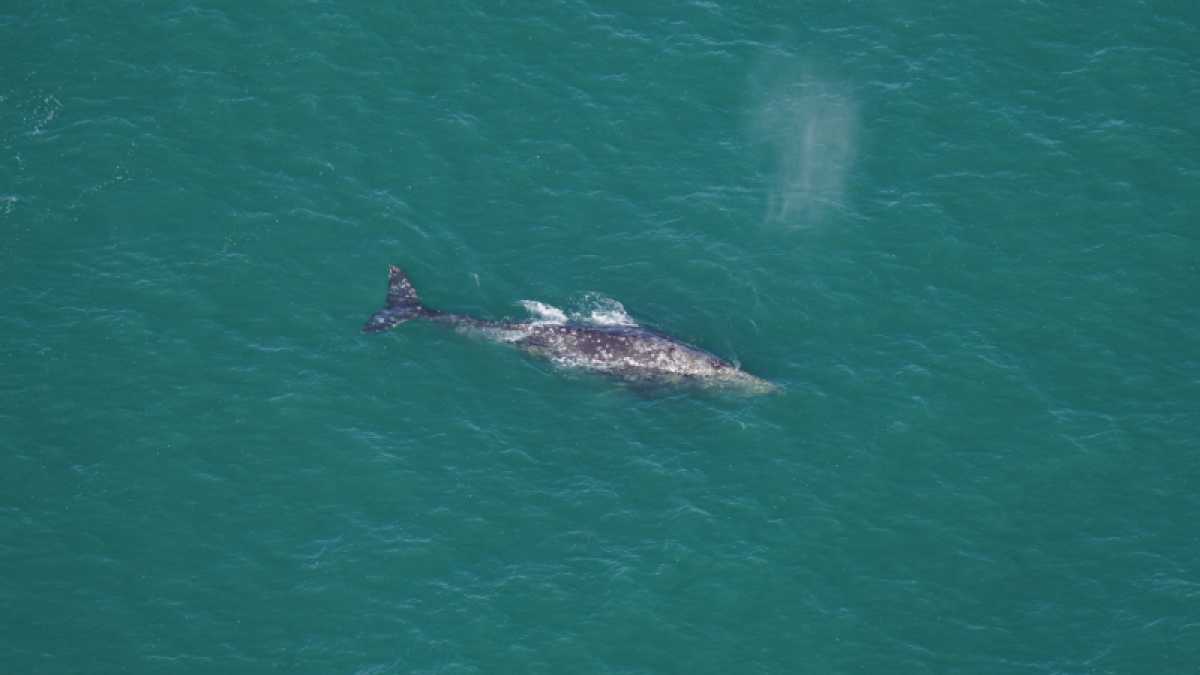World
Climate Change Impact: Extinct Gray Whale Spotted off New England Coast

Scientists have verified the presence of a gray whale off the coast of New England, a species long extinct in the Atlantic Ocean, highlighting the effects of climate change on marine life. Researchers from the New England Aquarium in Boston made the remarkable discovery while flying 30 miles south of Nantucket on March 1. This particular gray whale, typically residing in the northern Pacific Ocean, had disappeared from the Atlantic by the 18th century.
The finding aligns with five previous observations of gray whales in Atlantic and Mediterranean waters within the last 15 years, as noted by the New England Aquarium. Evidently, the whale located last month off Massachusetts likely corresponds to the same individual seen near Florida late last year, stated researchers from the aquarium.
Initially met with skepticism, the scientists circling the area were able to capture photographs confirming the presence of the gray whale. Orla O’Brien, an associate research scientist at the New England Aquarium, expressed excitement over the sighting but attributed it to planetary warming effects. The North-west Passage, connecting the Atlantic and Pacific Oceans through Canada’s Arctic region, has been ice-free in summers due to climate change, permitting the migration of gray whales.
Gray whales, historically hunted to near extinction during the commercial whaling era, have since recovered and are now categorized as a species of ‘least concern’ by the International Union for Conservation of Nature. Nonetheless, the western population of these whales, found off Asia, remains endangered according to the same organization. The distinctive features of gray whales set them apart from other species like humpback whales and minke whales.
Historical records referencing a ‘scrag whale’ off New England’s coast in the 18th century represent some of the final mentions of gray whales in the Atlantic. While paleontologists indicate a disappearance of these whales from Atlantic waters by the 19th century, recent sightings suggest a notable return to the Atlantic. The recent identification of a gray whale off Nantucket marks a significant event, potentially the first confirmed observation in New England waters since the 18th century.
Global warming, resulting in the Arctic ice melt within Canada’s North-west Passage, likely explains the resurgence of gray whales in the Atlantic. The New England Aquarium team links this phenomenon to the absence of thick winter ice, previously preventing gray whales from traversing the Passage. With the ice receding, these whales can now journey between the Pacific and Atlantic during summers, a feat impossible in previous centuries.
Experts like Leigh Torres, a marine ecologist at Oregon State University, foresee both positive and negative implications of gray whales venturing into the Atlantic. While the whales benefit from improved transoceanic mobility, concerns arise if their migration signals a quest for food due to dwindling prey in the Pacific. The decline in Arctic prey for gray whales has coincided with unusual mortality events in the eastern Pacific since the last decade.
Moreover, an increase in gray whale strandings from Mexico to Alaska since January 2019 raises alarms about their shifting habits and food availability. Torres speculates that the whales may be youthful wanderers straying off their usual routes, although reduced Arctic ice cover enables easier passage from the Pacific to the Atlantic. Gray whales’ adaptability to changing conditions, demonstrated by their ventures into novel feeding grounds, underscores their resilience in the face of environmental transformations brought about by climate change.












